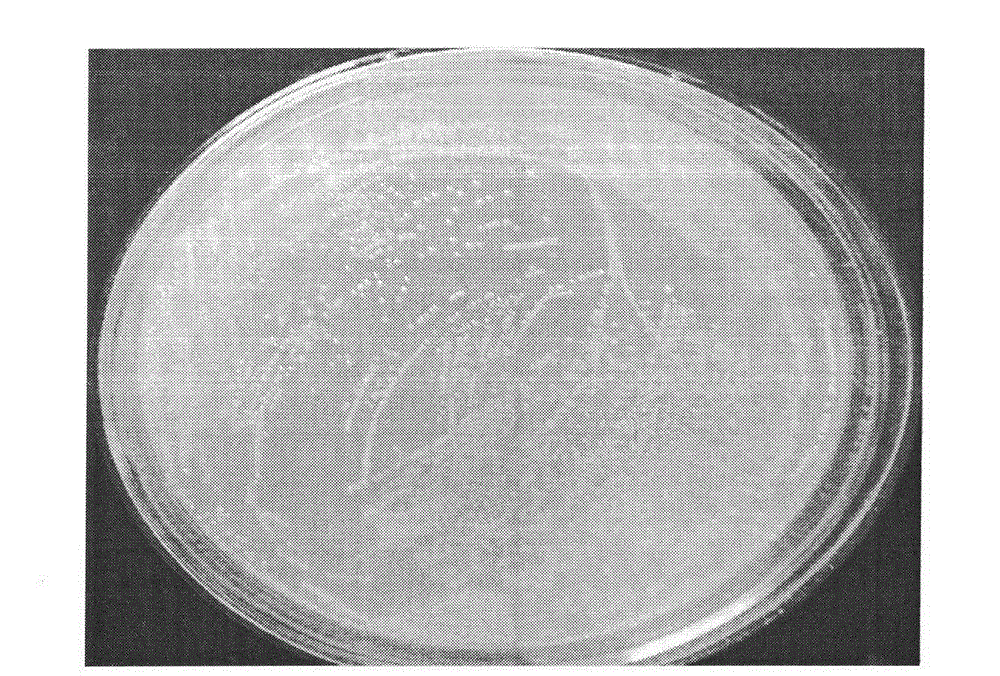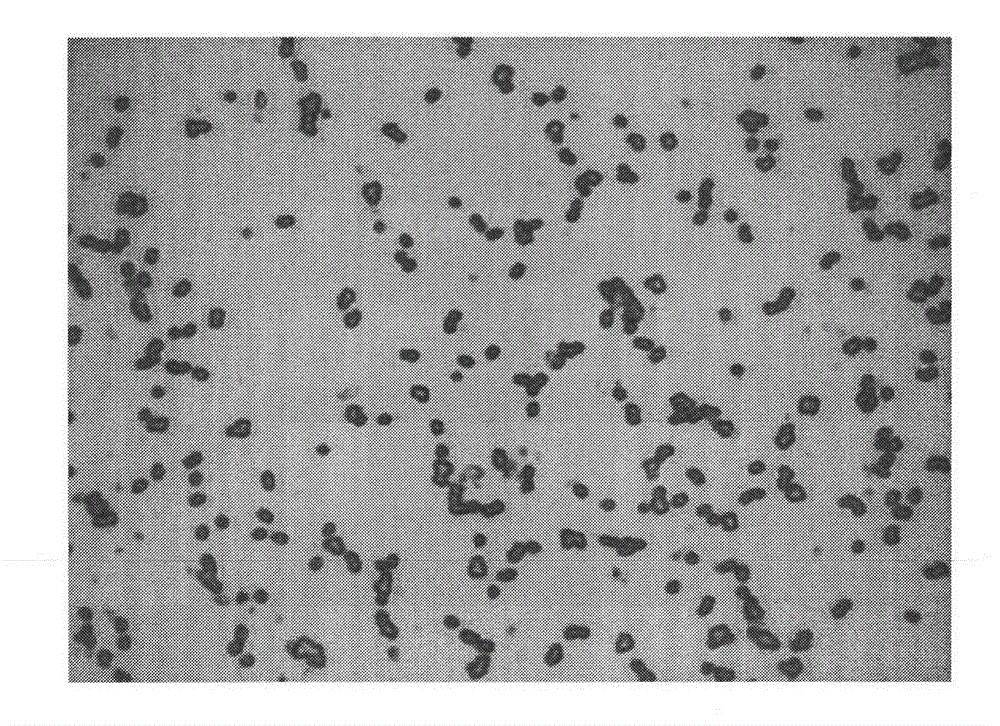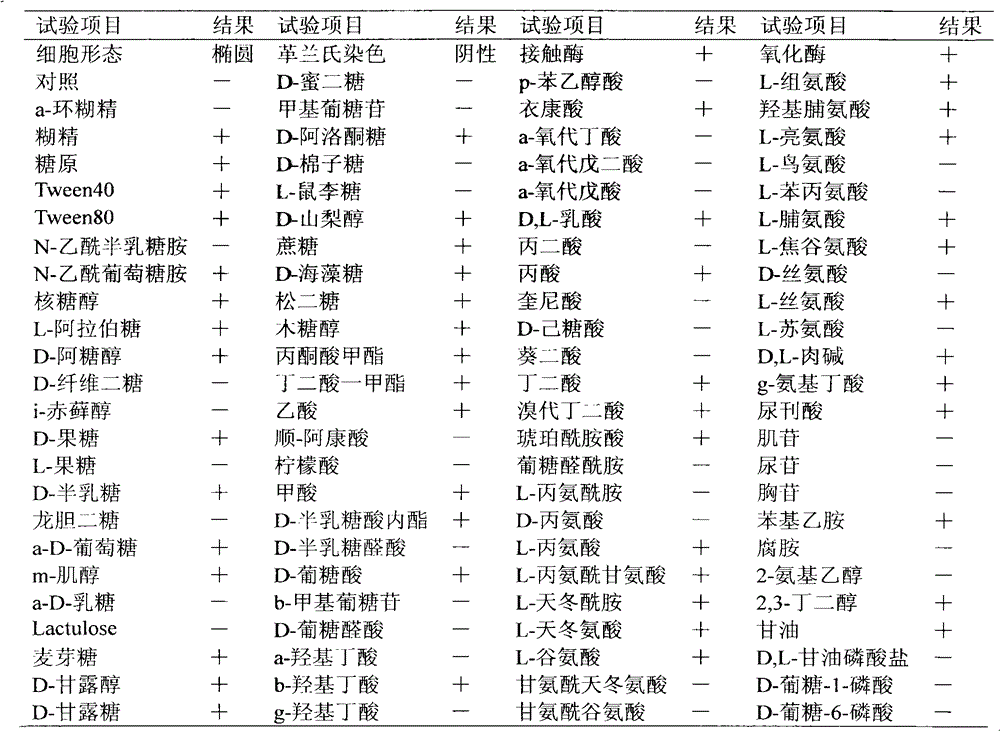Aerobic denitrifying Paracoccus denitrificans and application thereof
A denitrification paracoccus, nitrification denitrification technology, applied in the direction of aerobic and anaerobic process treatment, bacteria, etc., can solve the problem that the total nitrogen removal rate is less than 50%, the performance has not been reported, and further improve it to overcome the treatment Efficiency and economical applicability, efficient and economical denitrification, and stable biological activity
- Summary
- Abstract
- Description
- Claims
- Application Information
AI Technical Summary
Problems solved by technology
Method used
Image
Examples
Embodiment 1
[0032] Detection of the aerobic denitrification performance of Paracoccus denitrificans DN-3.
[0033] Preparation of simulated wastewater I (sodium succinate 4.3g, KNO 3 2.0g, KH 2 PO 4 1.0g, FeCl 2 ·H 2 O 0.5g, CaCl 2 ·H 2 O 0.2g, MgSO 4 1.0g, 1.0L water, pH7.0~7.5), the initial concentration of nitrate nitrogen is 277mg / L, and the mass ratio of carbon to nitrogen is 2.8. Treated for 26h under the conditions of dissolved oxygen (DO) of 0.5mg / L, temperature of 22℃ and pH of 7.0. The removal rate of nitrate nitrogen and total nitrogen is greater than 95%, and the removal rate of COD is greater than 90%.
[0034] Prepare simulated wastewater II (methanol 5.0mL, KNO 3 2.0g, KH 2 PO 4 1.0g, FeCl 2 ·H 2 O 0.5g, CaCl 2 ·H 2 O 0.2g, MgSO 4 1.0g, 1.0L water, pH7.0~7.5), the initial concentration of nitrate nitrogen is 277mg / L, and the mass ratio of carbon to nitrogen is 5.3. Treated for 29h under the conditions of DO 1.5mg / L, temperature 30℃ and pH8.0. Nitrate nitrogen removal rat...
Embodiment 2
[0036] Detection of heterotrophic nitrification-aerobic denitrification performance of Paracoccus denitrificans DN-3.
[0037] Prepare simulated wastewater III (4.3g sodium succinate, 1.25g ammonium sulfate, KH 2 PO 4 1.0g, FeCl 2 ·H 2 O 0.5g, CaCl 2 ·H 2 O 0.2g, MgSO 4 1.0g, 1.0L water, pH 7.0-7.5), the initial concentration of ammonia nitrogen is 265mg / L, and the mass ratio of carbon to nitrogen is 2.9. Treated for 34h under the conditions of DO 0.5mg / L, temperature 25°C and pH7.5. The removal rate of ammonia nitrogen and total nitrogen is greater than 95%, and the removal rate of COD is greater than 90%.
[0038] Prepare simulated wastewater IV (methanol 5.0mL, ammonium sulfate 1.25g, KH 2 PO 4 1.0g, FeCl 2 ·H 2 O 0.5g, CaCl 2 ·H 2 O 0.2g, MgSO 4 1.0g, 1.0L water, pH 7.0-7.5), the initial concentration of ammonia nitrogen is 265mg / L, and the mass ratio of carbon to nitrogen is 5.6. Incubate for 36h under the conditions of DO 2.0mg / L, temperature 35℃ and pH8.5. The removal ...
Embodiment 3
[0040] Paracoccus denitrificans DN-3 is used in MSG wastewater with high COD concentration.
[0041] The quality of MSG wastewater: the concentration of ammonia nitrogen is 300mg / L~450mg / L, and the COD is 700mg / L~850mg / L. First, the nitrifying bacteria cultivated in our laboratory are used to convert ammonia nitrogen into nitrate nitrogen, and the nitrification effluent is used as denitrification feed water. Then, DN-3 is used for aerobic denitrification. When the carbon source is insufficient, methanol is added to make the carbon-nitrogen mass ratio 3.0. The initial nitrate nitrogen concentration is 280mg / L, and the COD is 720mg / L. After treatment for 32 hours at a DO of 0.5 mg / L, a temperature of 30°C and a pH of 7.0 to 8.5, the removal rate of nitrate nitrogen and total nitrogen was greater than 90%, and the removal rate of COD was greater than 80%.
PUM
 Login to View More
Login to View More Abstract
Description
Claims
Application Information
 Login to View More
Login to View More - R&D
- Intellectual Property
- Life Sciences
- Materials
- Tech Scout
- Unparalleled Data Quality
- Higher Quality Content
- 60% Fewer Hallucinations
Browse by: Latest US Patents, China's latest patents, Technical Efficacy Thesaurus, Application Domain, Technology Topic, Popular Technical Reports.
© 2025 PatSnap. All rights reserved.Legal|Privacy policy|Modern Slavery Act Transparency Statement|Sitemap|About US| Contact US: help@patsnap.com



